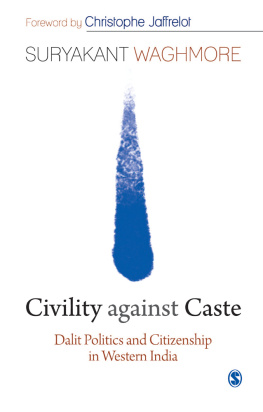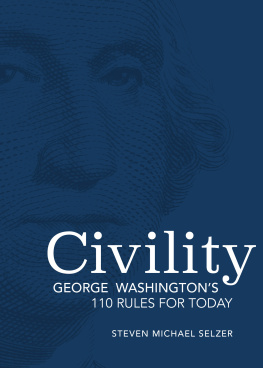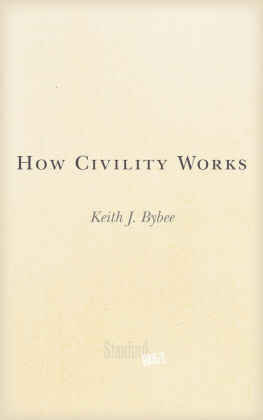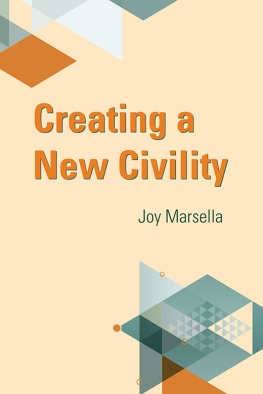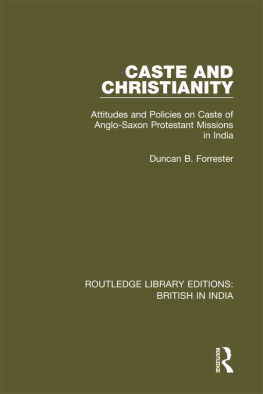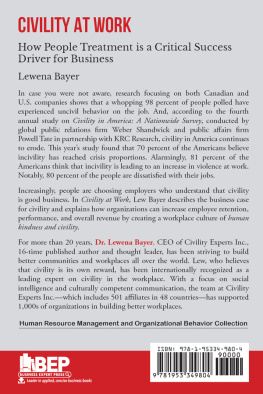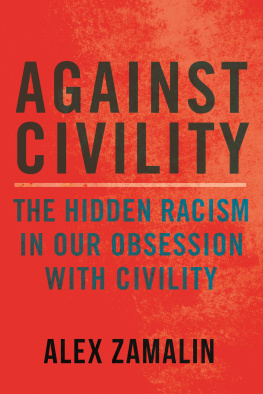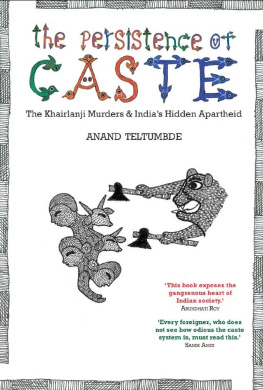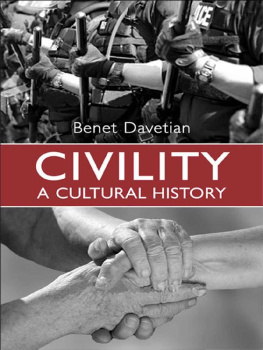Waghmore - Civility Against Caste
Here you can read online Waghmore - Civility Against Caste full text of the book (entire story) in english for free. Download pdf and epub, get meaning, cover and reviews about this ebook. publisher: Sage Publications India Pvt, Ltd -- eBooks, genre: Politics. Description of the work, (preface) as well as reviews are available. Best literature library LitArk.com created for fans of good reading and offers a wide selection of genres:
Romance novel
Science fiction
Adventure
Detective
Science
History
Home and family
Prose
Art
Politics
Computer
Non-fiction
Religion
Business
Children
Humor
Choose a favorite category and find really read worthwhile books. Enjoy immersion in the world of imagination, feel the emotions of the characters or learn something new for yourself, make an fascinating discovery.
Civility Against Caste: summary, description and annotation
We offer to read an annotation, description, summary or preface (depends on what the author of the book "Civility Against Caste" wrote himself). If you haven't found the necessary information about the book — write in the comments, we will try to find it.
Civility Against Caste — read online for free the complete book (whole text) full work
Below is the text of the book, divided by pages. System saving the place of the last page read, allows you to conveniently read the book "Civility Against Caste" online for free, without having to search again every time where you left off. Put a bookmark, and you can go to the page where you finished reading at any time.
Font size:
Interval:
Bookmark:

| BAMCEF | Bahujan and Minority Community Employees Federation |
| BBM | Bahujan Bharipa Mahasangh |
| BJP | Bhartiya Janta Party |
| BMP | Bahujan Majoor Paksha |
| BPL | Below Poverty Line |
| BSP | Bahujan Samaj Party |
| CBI | Central Bureau of Investigation |
| CM | Chief Minister |
| CPI | Communist Party of India |
| CPI (M) | Communist Party of India (Marxist) |
| DS4 | Dalit Shoshit Samaj Sangharsh Samiti |
| FIR | First Information Report |
| GoM | Government of Maharashtra |
| GP | Gram Panchayat |
| I/NGO | International/Non-governmental Organisation |
| MLA | Member of Legislative Assembly |
| MHA | Manavi Hakk Abhiyaan |
| MLC | Member of Legislative Council |
| MP | Member of Parliament |
| NCP | Nationalist Congress Party |
| NT | Nomadic Tribes |
| OBC | Other Backward Classes |
| PCR | Protection of Civil Rights |
| PM | Prime Minister |
| PWPI | Peasants and Workers Party of India |
| RDC | Rural Development Centre |
| RPI | Republican Party of India |
| SC | Scheduled Castes |
| SC/ST (PoA) Act | Scheduled Castes and Scheduled Tribes Prevention of Atrocities Act |
| SS | Shiv Sena |
| ST | Scheduled Tribes |
| ZP | Zilla Parishad |
Suryakant Waghmore is Associate Professor at the Tata Institute of Social Sciences (TISS), Mumbai. He completed his PhD in Sociology from the University of Edinburgh as a Commonwealth Scholar in 2010. He was a visiting scholar at the Centre for South Asia, Stanford University in 2013.
T his book has benefited from several passionate scholars and activists and I am indebted to them for their time and encouragement.
The activists and participants of Dalit movements were immensely benevolent for allowing me to be part of their lives and for tolerating my never-ending questions. I cannot mention names of all the individuals here but this does not in any way reduce the value of their generosity and contribution.
Eknath Awad, Manisha Tokale, Ashok Tangade, Tukaram Shinde, Madhukar Londe, Meena Lokhande Baba Dhule, Kailash Veer, Santosh Jadhav, Siddharth Shinde, Baliram Nade, Banage and Vishal Gaikwad came to my help in various forms whenever I needed them. Besides sharing their valuable time, they were generous in sharing important contacts and also helped me with logistics. Workers and supporters of the Bahujan Samaj Party (BSP) and Manavi Hakk Abhiyan (MHA) in the villages of Phule Pimpalgaon, Rajewadi, Massajog, Tandalwadi and various other villages and those from Beed, Majalgaon, Kaij, Georai and Ambajogai town, helped me understand their passionate politics and also the challenges facing Dalit movements.
This book is an outcome of my PhD research at University of Edinburgh. Both my supervisors Hugo Gorringe and Roger Jeffery were ideal mentors; they offered regular insightful criticisms and read through the draft chapters more than once. James Kennedy, Robert Morris and Christopher Harding read the initial form of this book and their suggestions were of considerable help. Some chapters of the book were presented in conferences and workshops. Discussions here, with Frdric Landy, David Mosse and Gopal Guru have helped develop some arguments.
Christophe Jaffrelot gave the initial leads for turning the thesis into a book and has been kind to write the foreword. The anonymous referee at SAGE was liberal in offering criticisms and suggestions. Thomas Blom Hansen did an incisive reading of the manuscript and suggested some critical churning. Hugo Gorringe continued to show immense perseverance to read the manuscript till it reached its final form.
I am grateful to my colleagues at Tata Institute of Social Sciences, S. Parasuraman, Bipin Jojo and Bodhi who helped me take the much needed PhD break.
My family members have made substantial contribution to this book through their unconditional support. Despite her own research worries, Qudsiya read through my chapters and lived out of bags to be there for me when I needed her the most. My brothers Shashikant and Chandrakant faced the droughts of Belgaum with ease, keeping me out of their difficult times. The struggles of Aai and Bapa, my maternal grandparents, stay a source of inspiration in my academic endeavours.
The effect of caste on the ethics of the Hindus is simply deplorable. Caste has killed public spirit. Caste has destroyed the sense of public charity. Caste has made public opinion impossible. A Hindu's public is his caste. His responsibility is only to his caste.
(Ambedkar 1945)
I am preparing to organise masses who have been victimised by the caste systemCaste is not a problem for us but an opportunity and we must know how to use it at the appropriate time and occasion.
(Kanshiram, undated: quoted in Mahanayak 2007)
T he above epigraphs from two prominent Dalit public figures reveal the complexity of state and civil society formation in India and the centrality of caste in these processes. Ambedkar framed the Hindu cosmology, its ritual sovereignty and caste publics as an illiberal condition of intolerance and rudeness. Civilising India through formation of a modern state and a dynamic civil society was central to Ambedkar's project of India's liberation. Ambedkar aspired to annihilate caste so as to create a truly liberal civility and civil society where political equality displaces the normality of caste violence.
Kanshiram's quote above sets out the complex strategies that post-Ambedkar Dalit movements enlist to make the ideals of Ambedkarism work. Caste, for Kanshiram, has a cultural and political role that could radically transform the unequal character of Indian society and democracy. Ambedkar's liberal critique of caste incivilities and Kanshiram's Ambedkarite praxis unravel the dynamism of caste and provide insights into the vibrancy of India's civil society and its problems.
In this chapter, I make a case for understanding civil society as a realm of political freedom that emerged in India during the colonial period. Based on an analysis of caste and the rise of Dalit politics in public sphere of western India, I call for a critical revision of the idea of civil society to counter arguments that either limits civil society to elite politics or caste politics to a decay of civil society. The limited spaces of political freedom that emerged in the colonial period were largely dominated by the upper castes (mostly Brahmans). However, the lower caste masses too were able to participate and influence the colonial state by organising around ideologies of protest that countered dominant nationalist currents. The growth of localised ideologies of protest and hegemony in associational and extra-institutional forms continued under the postcolonial democratic state.
The nature of mobilisation in the civil realm; and the interface of caste, civil society and state suggest two specific outcomes: firstly, community, particularly caste, became central in constructing local forms of civil/uncivil society and modernity. Secondly, caste and state continued to intersect and co-evolve in the local civilising processes of India.
Font size:
Interval:
Bookmark:
Similar books «Civility Against Caste»
Look at similar books to Civility Against Caste. We have selected literature similar in name and meaning in the hope of providing readers with more options to find new, interesting, not yet read works.
Discussion, reviews of the book Civility Against Caste and just readers' own opinions. Leave your comments, write what you think about the work, its meaning or the main characters. Specify what exactly you liked and what you didn't like, and why you think so.

